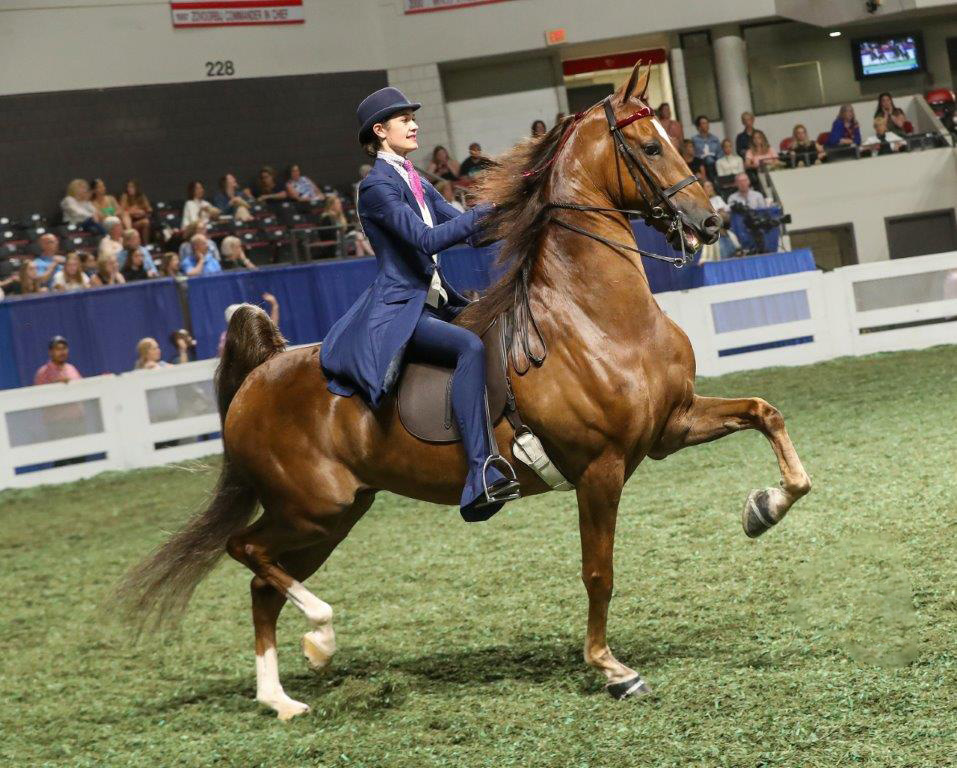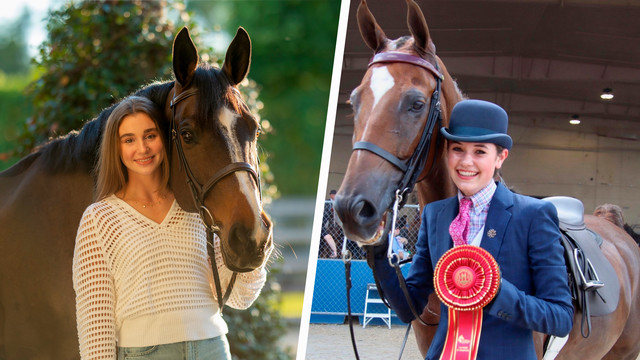University of Richmond students compete in high-level equestrian events
Student Experience
Sophomore Lillian Soroken was just four years old when she rode a horse for the first time. Growing up in New York City, she could only ride on weekends when her family went to their home in the Poconos. By age nine, her family moved to Princeton, New Jersey, and her riding time increased significantly.
“I was able to start riding more consistently. I got a lot more serious over the next few years,” Soroken said.
By her freshman year of high school, when she was just 13, she was on the road 250 days out of the year with the Beacon Hill Show Stables, one of the top equitation, hunter, and jumper training programs in the country. She participated in jumping competitions, urging her horses to great speed, galloping over obstacles as high as six feet.
She spent November to April in Wellington, Florida, competing in the Winter Equestrian Festival. “We’d go down there because it was too cold up north.” She still occasionally competes, including the upcoming WEF after fall exams.
Soroken attended a small, private Catholic girls’ school in New Jersey that accommodated her riding schedule by allowing her to join Zoom calls for class while she was traveling.
Back in the saddle
At the start of her sophomore year in high school, Soroken broke her collarbone and had to get a plate and six screws put in to repair the damage. The doctors said it would be six months before she could ride. The determined equestrian was back in the saddle in four weeks.

Lillian Soroken’s love for horses began at a young age. “Like the typical little girl, I wanted a pony for my birthday.”
That year, she and her dark brown Holsteiner gelding horse, known as DiCaprio 3, or sometimes as Leo, were champions at the National Horse Show in Kentucky.
Then, in 2023, Soroken and Hanakara, a Dutch Warmblood mare, were champions at the WEF and won bronze individually and silver for their team in the United States Hunter Jumper Association Zone Championships in Michigan. She was also ranked second in the nation in the Association's High Children’s Jumper Division in the months to follow, and she and Hanakara won Champion Horse of the Year for their successful season.
Now a Robins School business administration major with a concentration in finance, Soroken still occasionally competes and has close to 23,000 people on TikTok who follow her equestrian-related posts.
“I was at this crossroads when I came to college. I could either commit all my time to riding and decide that this is what I want to do for the rest of my life. Or I could put riding on the back burner and go to school and get a job, and then go back to riding later, once I've made some money and could support myself,” she said. “That's what I decided to do.”
Last summer, she interned with the largest horse breeder in the world, Schockemöhle Sports in Germany. She worked 12-hour days with a small team of horses, exercising and caring for them every day. One of her assigned horses sold for 1.2 million euros.
“Unfortunately, I didn't get to pocket any of that money,” she said, with a laugh. “But it was very cool just to see the business side of the sport, because all my life I've spent it on the competition side.”
Pulling in the reins
Riding has always been a significant part of senior Katie Sinclair’s life. Her mother, who was raised on a ranch in California, passed down her love of horses.
“Growing up, I tried soccer and dance and every sport around the sun. The only thing that stuck were the horses,” Sinclair said. The barn was just ten minutes from her house, making it easier for her to ride four to five times a week.
Sinclair competes in a style of English riding called saddle seat that does not involve jumping. The style is designed to highlight a horse's elegance and animation, and is associated with breeds like the American Saddlebred. Saddle seat has multiple divisions, and Sinclair competes in an equitation division that involves two parts. The first is rail work, where riders lead their horses around the ring at the same time, executing the walk, trot, and canter while practicing their form and horsemanship. In the second, riders compete individually, leading the horse through a complicated pattern, including pivots, figure eights, and serpentines.

“Saddle seat is very focused on a horse's performance, and from you working the horse to bring out the best in them,” Sinclair said. Judges look for the horse to move in an upright framework, with high steps and neck.
“Communication is important. You are communicating with a several-thousand-pound animal that has a mind of its own,” she said.
Four years ago, Sinclair placed second at the World Championship Horse Show in Louisville, Kentucky in the Three-Gaited division. She had only ridden the horse once before.
“It was a true test of myself as a rider, and my ability to adapt to a brand new horse in a brand new, highly competitive setting,” she explained.
Like Soroken, Sinclair cut back on her equestrian competitions when she got to college. “Coming to Richmond, I did put riding aside from the level that I was competing at before because I really wanted to be able to take advantage of everything that this school has to offer,” Sinclair said.
She became a member of the track and field team this year. She is also a Gary L. McDowell Institute Student Fellow and on the President’s Student Advisory Board. Sinclair, a political science major from Palo Alto, plans to attend law school in California. She still goes riding at a nearby barn when she’s back home.
This December, she and her mother will travel to South Africa to compete with the U.S. Saddle Seat Association Team in the equitation division. She admits her plate is full but wouldn’t have it any other way.
"If I look at what horses have done for me, it really is all about instilling discipline and work ethic," Sinclair said. "Those are the skills that allowed me to balance doing so many different things on this campus."

